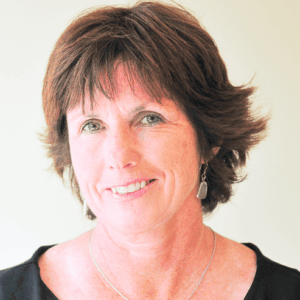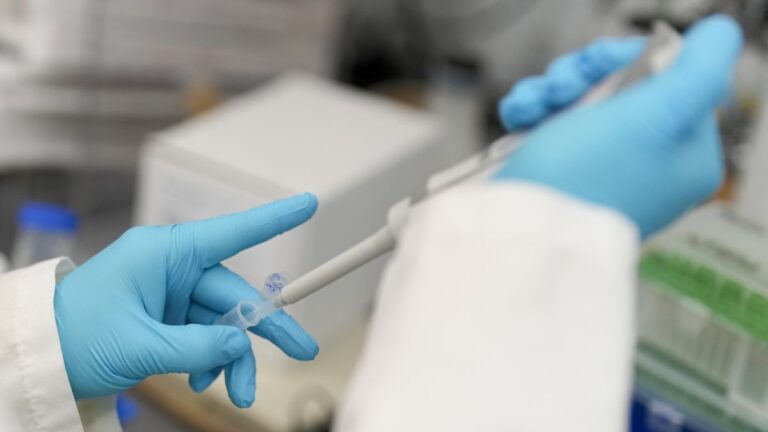The angel appeared on the cold Camden sidewalk.
Chef Jordan Benissan stood outside his restaurant after another dismal night of business. As COVID-19 infections surged, customers disappeared.
Benissan’s staff had shrunk to himself and a dishwasher. He worried about paying his monthly $2,000 rent.
As the days grew shorter and colder, the 62-year-old chef worked some shifts without earning a penny.
On this December evening, the stranger that Benissan would later call an angel approached him.
A business owner herself, Bettina Doulton understood Benissan’s heartache. She had to close her wine tasting room in September because of the pandemic.
She often walked by Benissan’s restaurant and worried about its empty dining room. “I’ve got to start getting takeout to help him,” she told herself.
When Doulton drove by on this Sunday evening and saw the chef outside, she turned her car around.
“I didn’t have a plan,” Doulton said. “I just wanted to give him a little bit of hope.”
After asking to see his menu, she handed the chef her credit card.
“I want to buy 50 meals,” Doulton told him. “and I want you to give them away to people to try your food.”
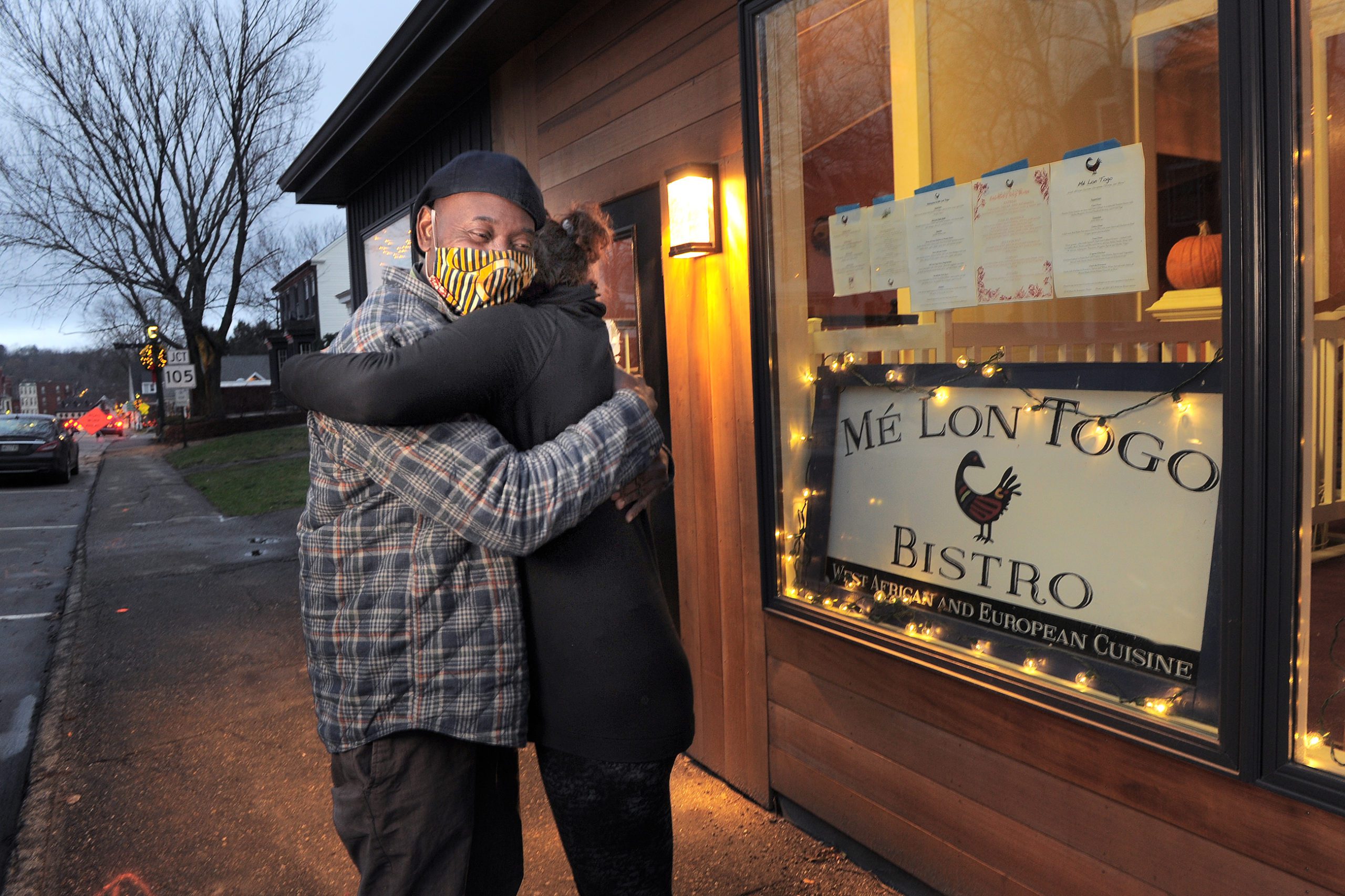
Benissan was speechless. He hugged Doulton and rang up the $2,000 in free meals and another $500 that Doulton threw in for tips.
“If I can just have some good happen through this moment,” he thought, “there is hope.”
Hope and despair. Heartbreak and courage. Small miracles and stunning kindness. Heroes stepping up in factories, hospitals, neighborhood kitchens, lobster boats, funeral parlors and tiny town churches. It has been a year of astonishing goodwill and soul-crushing loss.
The pandemic has shuttered businesses, stolen lives, sparked depression, anger and dissension. But out of the darkness there have been many flames of light. These are the stories of Mainers, ordinary people doing extraordinary things.
• • • •
Before the Camden chef received a generous gift from his “angel,” he struggled to hang onto his dream. He had come to Maine in the 1990s to teach music at Colby College. Along with sharing drumming skills he learned in his native West African country of Togo, he created savory African dishes that his mother often made.
Spurred by friends who relished his cooking, Benissan opened a small restaurant in Searsport in 2017. His initial success allowed him to open a Waterville restaurant in May 2019. He named them both after his country: Me Lon Togo or “I love Togo.” The restaurants’ spicy peanut sauces and French-inspired creole dishes became popular.
“People raved about the food and returned with their friends,” Benissan said. “I was encouraged, and I thought things were good.”
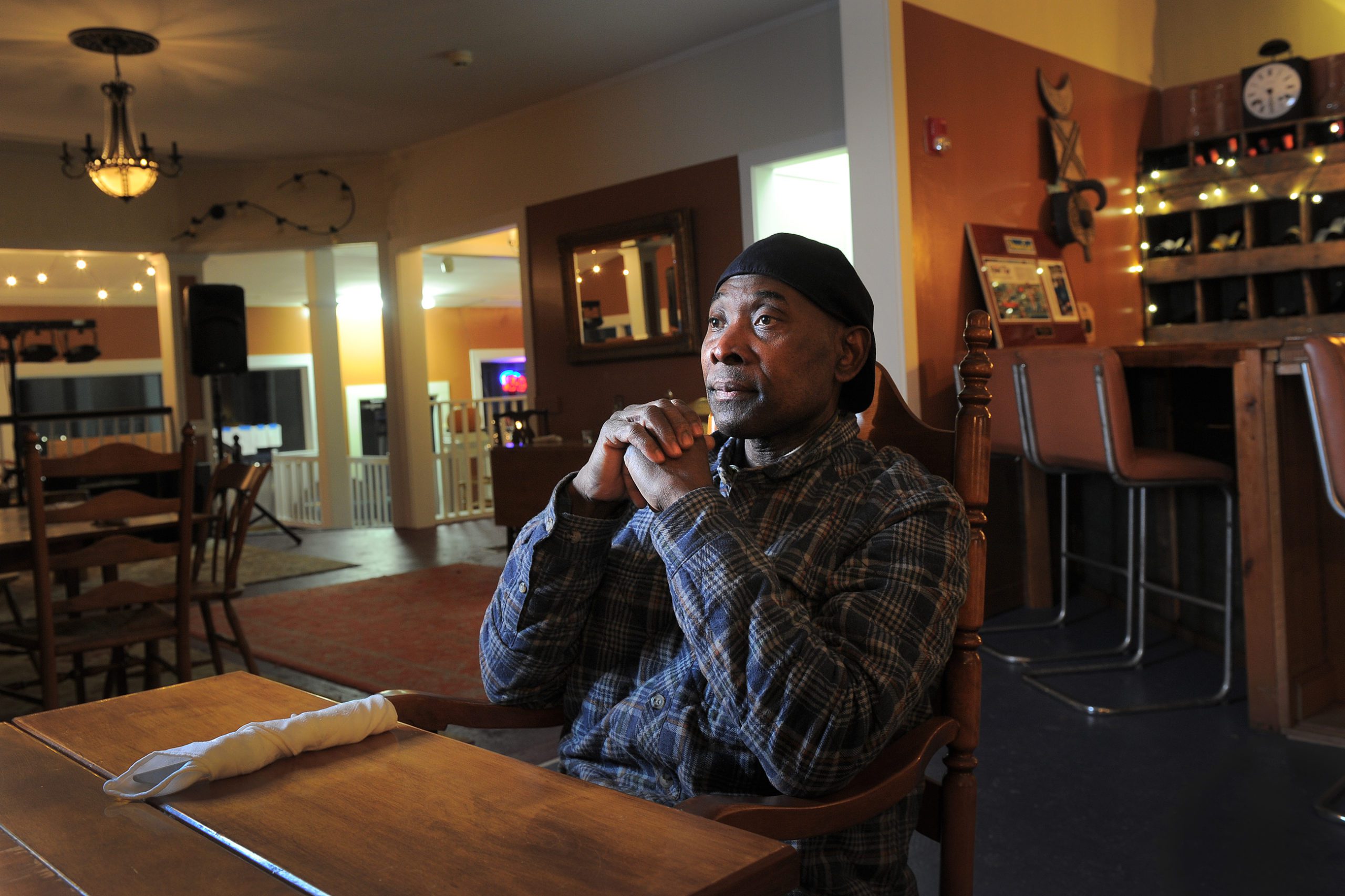
Nine months later the pandemic hit. Benissan, like other Maine restaurant owners, was forced to close during the state-mandated shutdown. He was $6,000 in debt and unable to pay rent. Faced with eviction, Benissan made plans to close for good, but a Maine food blogger and other restaurant owners rallied to keep one of Maine’s few Black chefs in business. They created a GoFundMe page and raised more than $16,000 in two weeks.
“They told me to use the money to do whatever I wanted, to pay my bills,” Benissan said. “They said I didn’t have to relocate, but this money that was given to me by a lot of strangers was not mine. I needed to find a way to give back.”
People raved about the food and returned with their friends. I was encouraged, and I thought things were good.”
— Jordan Benissan, owner of Me Lon Togo restaurant
In July, Benissan found a suitable space on Elm Street in Camden. He spent weeks renovating and painting the old furniture showroom. During the summer, new and old customers gave Benissan renewed hope. Then the tourists left the seaside town and the virus spiked to record levels.
Some nights the phone did not ring, and Me Lon Togo’s dining room remained empty. Stressed and sad, Benissan went home clinging to hope.
Bettina Doulton understood the anguish of owning a business during COVID-19. After a 21-year career at Fidelity Investments, she bought CellarDoor Winery in Lincolnville in 2007 and expanded the business with a Portland tasting room in 2014.
Unable to host large gatherings and parties during the pandemic, Doulton closed the Thompson Point venue in September. Though her 68-acre Lincolnville winery and vineyard remained open, selling to retail stores and offering socially distanced tastings, “the past year,” Doulton said, “was really, really ugly.”
RELATED: In percentage of owners as well as earnings, Black-owned businesses lag behind white counterparts in Maine
“I know what it’s like to put your dreams, your hopes into a business,” Doulton said. “And I know what it’s like to have your dreams busted.”
After watching Benissan’s customers dwindle on her daily walks through town, Doulton knew she had to do something. During her spontaneous sidewalk meeting with Benissan, an idea popped into her head.
“We’re going to get people to try your food,” she told Benissan before handing him her credit card.
With her $2,500 gift, the chef agreed to post 50 free meals on Facebook, offering dinners to new customers.
“I can’t fix COVID,” Doulton said, “but maybe I can be the pebble in the pond. If he gets 50 new people to try his food and figure a way to keep them coming back, maybe he’ll make it. You just hope the ripples from that pebble in the pond make a difference.”
• • • •
As she drops the cotton swabs between the tiny teeth on the conveyor belt chain, Irene Chase cannot help but wonder, “Where is this one going today?”
“Is it going to a hospital, or the armed forces, or is it going to a foreign country?” Chase silently muses.
Chase is a sterile wrap operator at Puritan Medical Products in Guilford. Since March, the 68-year-old employee has often worked 10-hour days, six days a week. Despite the long hours, she never tires of the job or forgets how important each swab is.
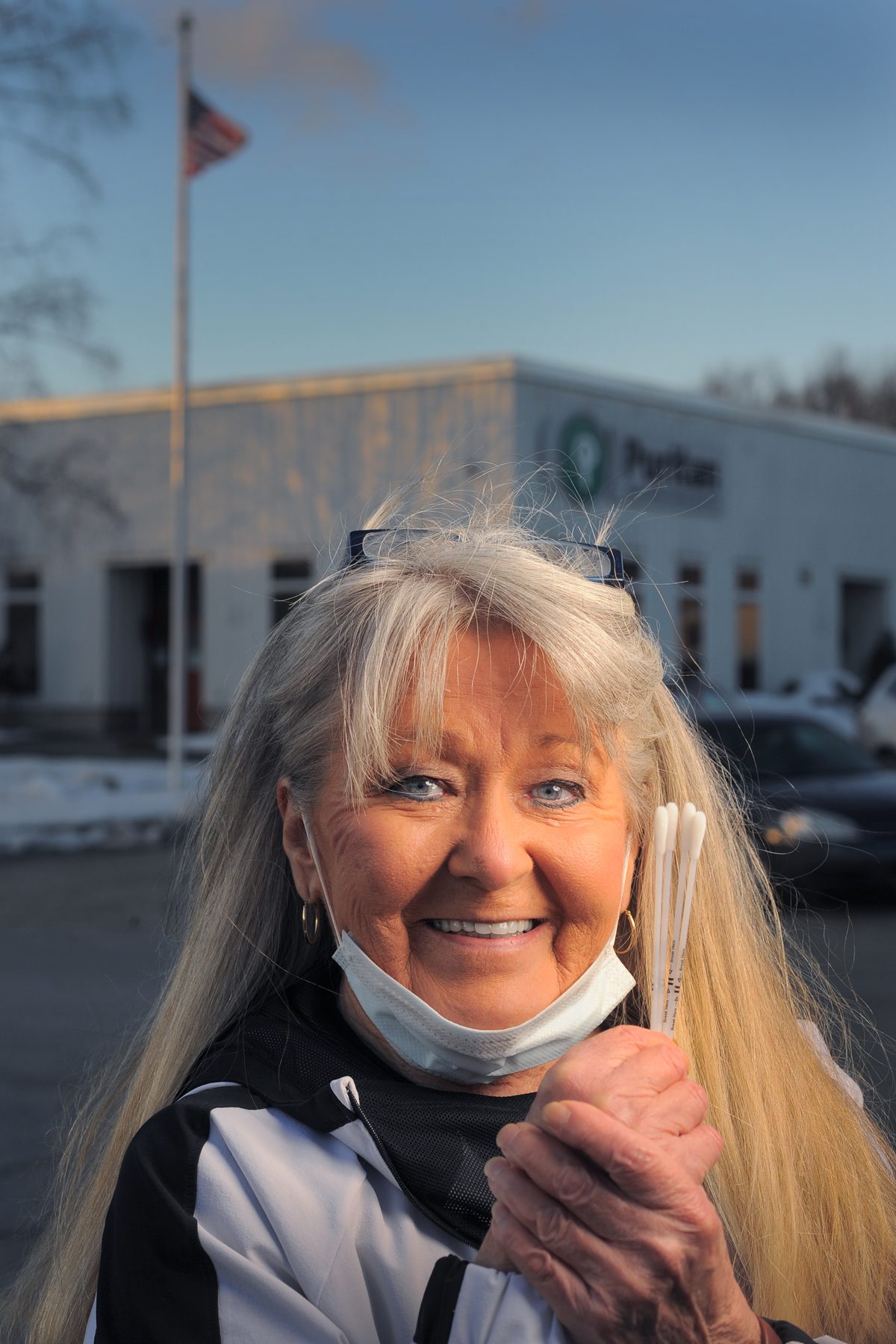
“You take a look at everything going on in the world and how serious this (pandemic) is,” Chase said. “You hope that the swab can get to a person before they infect someone. You feel like you are saving lives.”
Founded as a toothpick maker 100 years ago, Puritan is one of only two companies in the world that manufactures the special nasopharyngeal swabs required for COVID testing.
As the pandemic swept across the United States, top health officials asked Guilford’s owners to ramp up production of the desperately needed swabs.
By early summer, the company was producing 20 million swabs a month, and after opening a new Pittsfield plant with an additional 400 employees, the company increased production to 65 million.
The daughter of a military dad, Irene Chase grew up in Dover-Foxcroft, where she learned to work at an early age and appreciate a good-paying job.
“I started picking strawberries when I was 11 at 10 cents a quart, and I haven’t stopped working since,” Chase said.
In March, when Puritan’s co-owner Timothy Templet told his 500 employees he needed them to step up and do as much as possible to make swabs and stop the pandemic, Chase was ready.
“It was overwhelming at first,” Chase said. “He said the government needed millions of swabs as fast as we could make them.”
An identical twin known for her laughter and love of Disney character Cruella DeVille, Chase started getting up at 2:30 a.m. daily to work her 10-hour shift. Each shift, she and her sterile wrapping partner box up about 37,000 swabs.
“She’s a dedicated, dedicated essential worker,” said her sister, Earlene Hartford. “She takes pride in her work and the people she works with. They’ve worked their butts off since the day they were asked to step up.”
You take a look at everything going on in the world and how serious this (pandemic) is. You hope that the swab can get to a person before they infect someone. You feel like you are saving lives.”
— Irene Chase, sterile wrap operator at Puritan Medical Products Co.
By the time Chase gets home to the house she shares with her sister, she’s dog tired. A couple hours later, she’s in bed, sometimes at 5:30 p.m. and never later than 7, resting up for the 2:30 a.m. alarm.
“Sometimes I’m so tired I lie down with my facemask around my chin,” Chase said.
Around Dover-Foxcroft, a town with a rich mill history, workers like Chase are considered heroes, her sister said.
“Everybody is proud of them,” Earlene Chase added. “People that worked in mills, you know they don’t get recognized. It took COVID to see how important they are.”
Chase is also careful about going out around town. As well as fearing for her health, she doesn’t want to miss a day of work.
“If I get sick, that’s one less employee Puritan Medical has at their facility,” she said. “And we’re needed. We’re needed badly up there.”
She also canceled her Christmas trip to Georgia to spend time with her son.
“I’d have to quarantine for 14 days,” she said, “and I can’t do that to the company.”
Along with the long hours, there are benefits to working at Puritan. The owners and supervisors often walk through the plant, talking to employees.
“They say thank you for coming in. You’re doing a great job. That means a lot to the co-workers.”
There are also financial incentives for working extra hours. Chase and other employees who put in 40 hours by the end of their shift Thursday get double-time for coming in Friday and triple-time for working Saturday.
“In those two days you can make as much as you do working 40 hours a week,” Chase said.
There is also a bit of fun on the weekend shifts, Chase said.
“We laugh; we sing songs, Christmas carols,” she said. “You have to lighten up. Sometimes some of us are so tired from working so many hours.”
Considered one of the company’s top employees with a keen eye for quality, Chase was chosen to be in the plant when President Trump visited in early June.
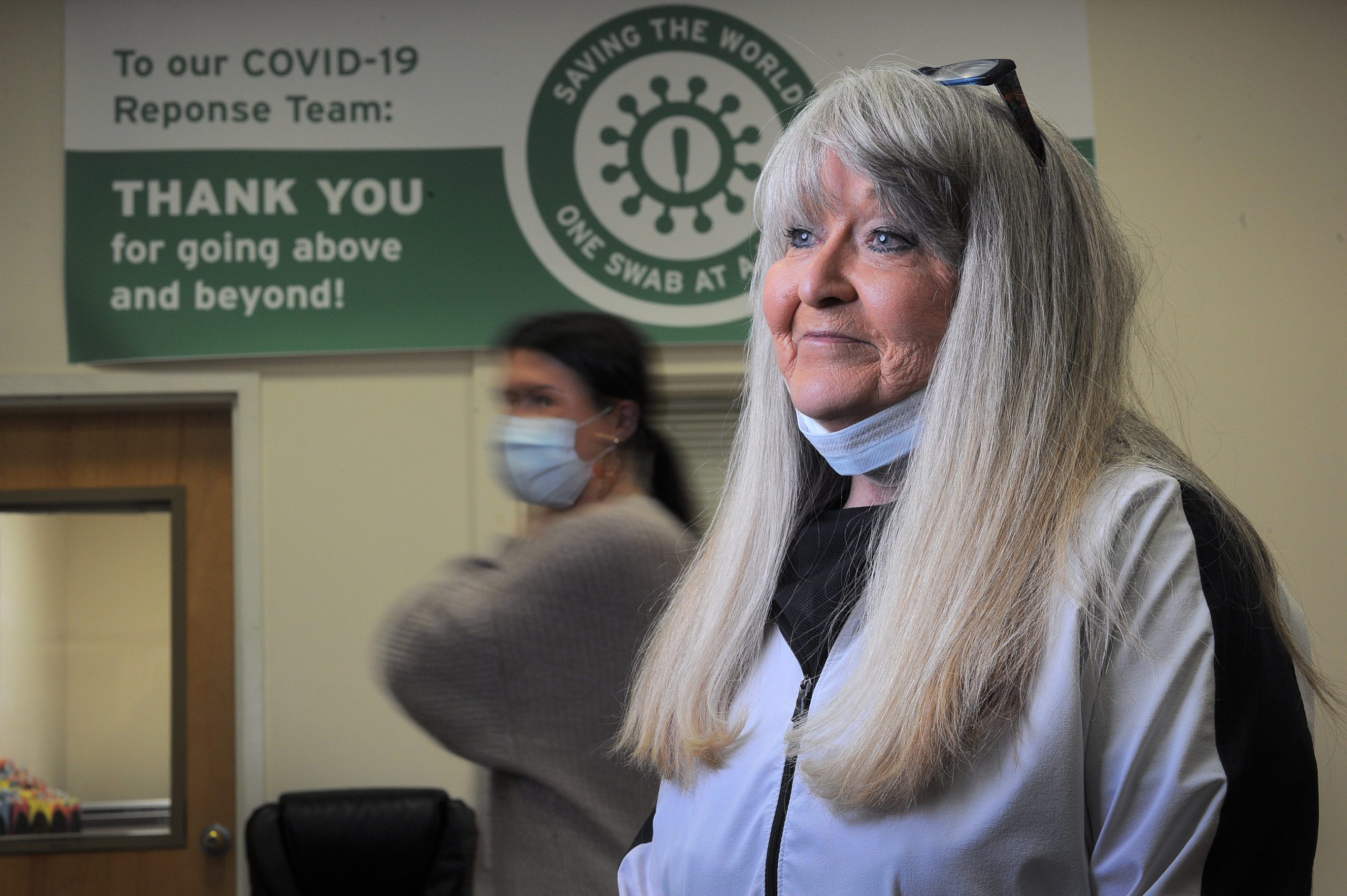
“Just knowing that the president of the United States was going to be coming to our little town of Guilford and coming to Puritan Medical, we were all so excited,” she recalled. “With the (Secret Service) all around everywhere. It was almost like being on a movie set.”
Chase stood proudly by the production line and her sterile wrapping machine. She wore a Trump cap pulled over her hairnet.
“All of a sudden he walked by and said ‘I like your hat,’” Chase said.
Trump turned to his Secret Service agent and said, “I love her.”
“You get up here,” he told Chase. “I want to get my picture taken with you.”
As she walked toward the president, he told her, “Don’t get too close.”
The White House later sent Chase the photograph of her and Trump.
“What an experience,” she said. “I’ll never ever forget it.”
• • • •
The gray-haired ladies smile and tell their stories.
Some of them have lost their husbands and live alone. Many of them have little to spare and are grateful for the gift.
“I can’t believe I’m going to have lobsters on Christmas!” they exclaim.
The veterans dig out their wallets, wanting to prove they served their country before taking home anything for free.
The homeless and those who have lost their jobs cry, thankful for the stranger that gives them a bag full of lobsters.
For the past six years, lobsterman Noah Ames has parked his truck at a local Thomaston business and given away lobsters on Christmas Eve to families and people in need.
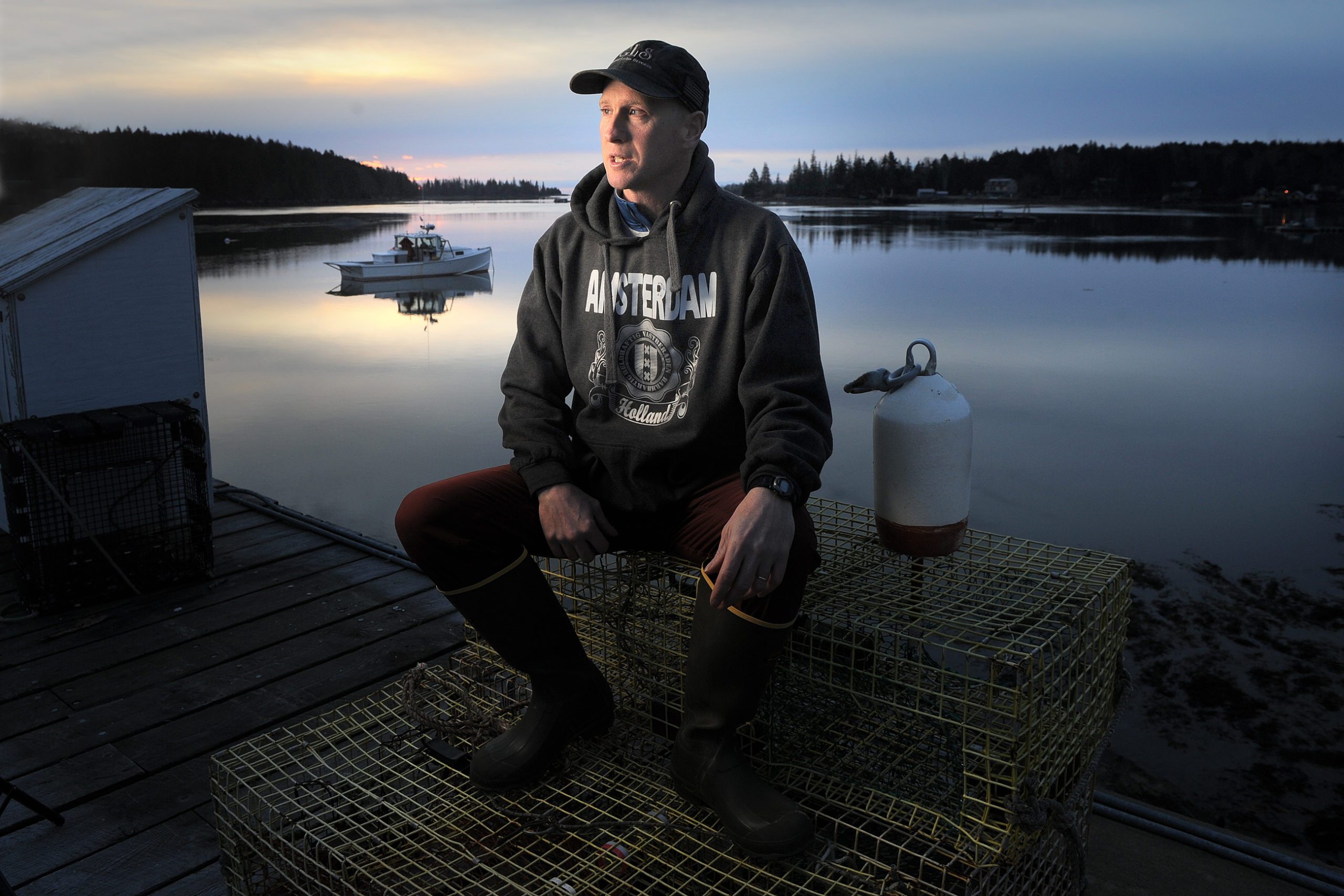
In an early December Facebook post, Ames reminded his friends and fellow fishermen of the event that begins at noon on Dec. 24 at Midcoast Marine on Route 1.
“The family and I will be giving away lobsters again this year for families in need,” Ames wrote. “All are welcome no questions asked, military personnel and families thank you, and please come get some lobsters. This has been a trying year for most, so let’s spread some happiness. Merry Christmas.”
Ames’ Facebook post about the lobster giveaway was shared 1,500 times by people throughout the country. Local lobstermen and businesses donated 600 pounds of lobsters. Ames himself will contribute 100 pounds.
People in the community and throughout Maine also wanted to help. Ames suggested they donate Hannaford gift cards. He ended up collecting $400 worth.
“I’ll save those cards for people that really look like they could use something extra,” Ames said.
Lobstermen are the heart and soul of America. The men donating lobsters for the giveaway are some of the best people on earth. They’re guys that work hard and take care of their families. They’re awesome human beings.”
— Noah Ames, Thomaston lobsterman
The 45-year-old lobsterman was surprised at the outpouring of generosity this year.
“This has become a community project,” said Ames. “It’s taken on a whole new level.”
Ames started the tradition to teach his children the meaning of Christmas.
“I just wanted to instill in them that it’s cool to give back,” Ames said.
The first year, he gave away 100 pounds of lobsters he caught off his boat, the Jennifer V., named after his wife.
A 13th generation fisherman, Ames grew up on the rugged island of Matinicus. He later moved to Rockland and started his own family. He hauls lobsters year-round, and is certain there’s no better profession or people to work with.
“Lobstermen are the heart and soul of America,” Ames said. “The men donating lobsters for the giveaway are some of the best people on earth. They’re guys that work hard and take care of their families. They’re awesome human beings.”
The fishing industry, like many other jobs, suffered this spring as COVID-19 crept into Maine, shuttering restaurants and decreasing the demand for the state’s iconic crustacean.
“We lost tens of thousands in the spring, when we were trying to sell lobsters ourselves,” said Ames of his fellow fishermen. “We were getting half the price of what we would usually get for them.”
But things improved in the summer, and Ames considers himself fortunate.
“I’m lucky to have a job,” he said. “If you drive through Rockland, Camden and Thomaston, there are so many businesses closed. It’s heartbreaking. Those businesses were someone’s heart and soul, and now they’re just gone.”

In recovery and sober for the past 10 years, Ames knows what it’s like to be in a dark place. He’s grateful for the people who helped turn his life around.
“I’ve had some awesome human beings that helped me tremendously, and now I just try to do my part,” he said.
Over 100 Facebook members commented on Ames’ generosity and goodwill.
“In a year of so much suffering and discord, your good deed shines like a star in the night,” one woman posted. “God bless you and your family.”
I’ve had some awesome human beings that helped me tremendously, and now I just try to do my part.”
— Noah Ames, Thomaston lobsterman
With the pandemic and thousands of Mainers out of work, Ames expects he will get a good crowd this year. He knows some people have a hard time taking handouts so he encourages others, “if you know somebody that needs help, come get some lobsters for them.”
In past years, people have shown up expecting a hidden fee or charge.
“What do you mean these lobsters are free?” they ask Ames.
“Just take them,” the lobsterman says. “Have a special Christmas dinner.”
Like they have done for the past several years, Ames’ children will join him this Christmas Eve, handing out lobsters to strangers and neighbors.
Thirteen-year-old Nadia is eager to help her dad and see the smiles on hundreds of faces.
“I’m proud of him for doing this,” she said.
Ames’ son Jack was 15 when his father began the holiday tradition. He is 21 now and hopes the free lobsters can take away someone’s hardship, even for one night.
“People might be alone or sad this holiday,” he explained, “and this can bring light into their lives.”
As the sky darkens on Christmas Eve and the last lobster is handed out, Ames will go home with his children and reflect on the day. He will remember the faces of people, young and old, who drove away smiling, crying and grateful.
“It makes my Christmas pretty special,” he said.
• • • •
The petite Filipino woman walks into the COVID-19 ward with a smile behind her mask.
Elizabeth Leavitt enters a room with her bucket, mop and disinfectants.
In her sing-song voice she asks the patient, “How are you doing?”
Tears well up in the patient’s eyes.
“It’s OK,” Leavitt tells them. “You are going to get better. You are going to go home.”
Sheathed in protective gear, Leavitt is one of Southern Maine Health Care’s 25-member housekeeping staff who clean COVID-19 patients’ rooms and ICU units where people cling to life.
They may not be doctors or nurses but they are critical – especially as the pandemic surges – in keeping the Biddeford hospital free of germs that can kill or sicken patients.
And they do a lot more than scrub walls, mop floors and disinfect surfaces. They offer compassion, encouragement, prayers and sometimes a song to patients who are scared, lonely and sad.
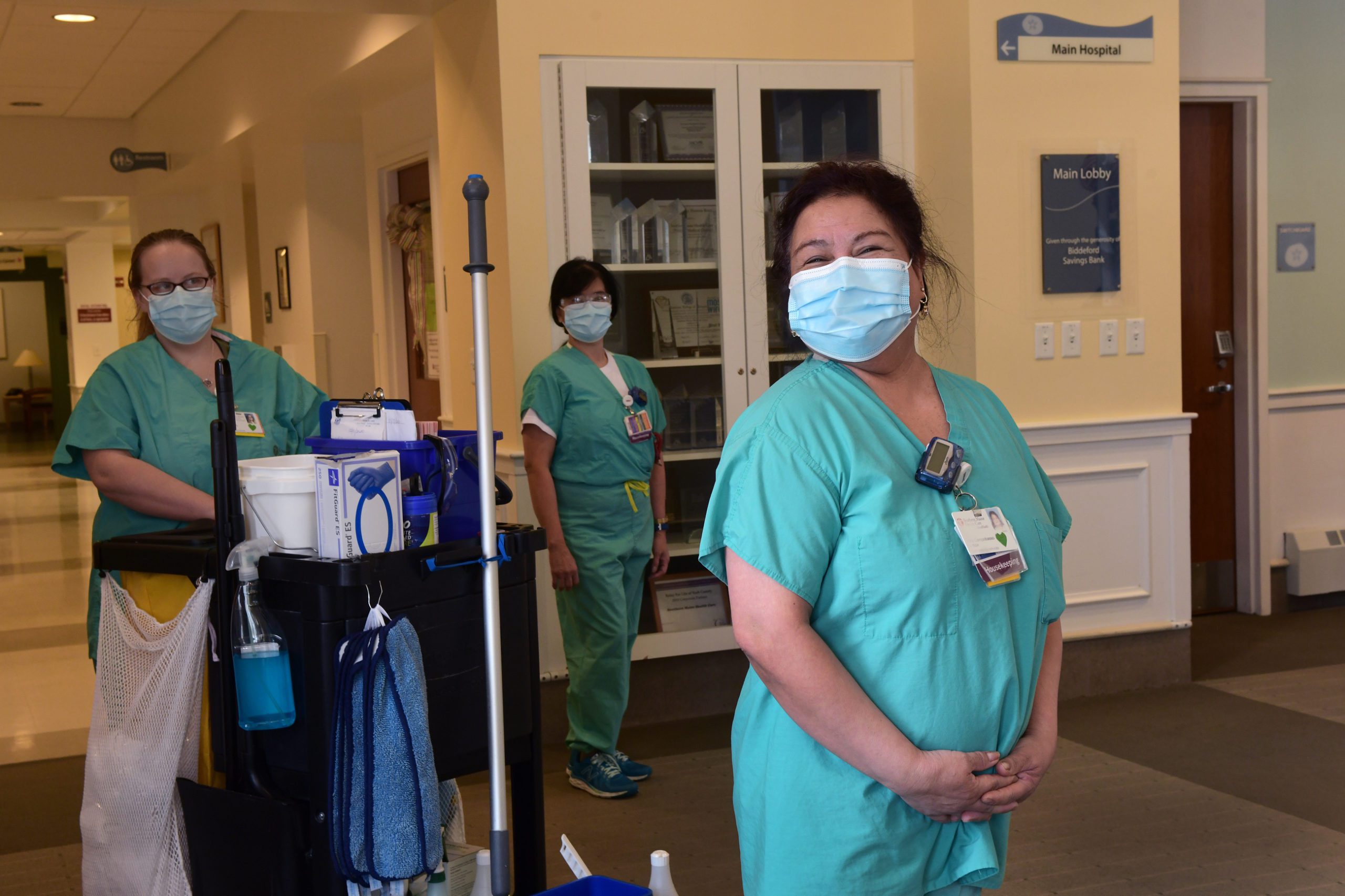
Each one of his housekeeping staff are extraordinary and take pride in their jobs, said Ben Rocheleau, the environmental services operations manager.
“Just like nursing, we create a bond with each of our patients on a day-to-day basis,” said Rocheleau. “We’ve got people that show so much love to these patients, who don’t have much right now because they aren’t able to have family in the room with them.”
Just like nursing, we create a bond with each of our patients on a day-to-day basis. We’ve got people that show so much love to these patients, who don’t have much right now because they aren’t able to have family in the room with them.”
— Ben Rocheleau, environmental services operations manager at Southern Maine Health Care
A little over 5 feet, Elizabeth Leavitt is proud to explain she has worked at the hospital for “11 years and four days.” She is a powerful presence when she enters a hospital room.
“Hello,” she says in a bold and cheerful voice. “I’m Elizabeth. Do you need anything before I clean?”
Sometimes she offers blankets, water or ice chips.
“We comfort the patients all the time,” she said.
Fond of humming as she cleans, Leavitt often absentmindedly begins to sing as she washes walls or floors. Most often she sings church songs like “In the Garden,” which is about finding comfort.
“Sometimes they sing with me,” Leavitt said.
The patients also ask her to pray for them.
“One lady asked me to pray and I did. She said it made her feel better.”
Other times, patients cry.
“They talk about missing family and they’re crying,” Leavitt said. “I tell them, don’t worry, you’ll see them soon.”
Leavitt is especially fond of the elderly patients.
“In my culture we love old people,” she said. “We care for old people.”
RELATED: Together, to the compassionate end
Even when she’s not at work, she can’t help but think of her patients and the ones who have died.
“They’re in my mind,” she said.
Months before the pandemic began to spread in Maine, Leavitt talked to her family in the Philippines about the COVID-19 cases in her native country. Her niece who works in a hospital there urged her aunt to wear a mask.
“They say COVID is so dangerous …” said Leavitt. “I prepared myself and when it hit the hospital, I was really nervous.”
Like Leavitt, Edna Campobasso is from the Philippines and was frightened of this new disease that was killing people all over the world. Despite training and protective gear, the 58-year-old woman was worried about her health and bringing the virus home to her family.
Campobasso was the first to clean a COVID patient’s room at the hospital.
“Oh my god, I’m scared, I sweat,” she said. “I do my best but you didn’t know. Maybe I get sick?”
The patients say, ‘I am happy you are smiling.’ They are family. This is how I want my family to be taken care of.”
— Edna Campobasso, housekeeper at Southern Maine Health Care
Since then the hospital has treated 130 COVID-19 patients, and Campobasso has lost count of how many rooms she has cleaned where the virus is present.
“I’m not really worried now,” said Campobasso, who began working at the hospital six years ago.
Campobasso is known among the staff and patients as the cleaning lady with compassion and smiling eyes.
“The patients say, ‘I am happy you are smiling,’ ” Campobasso said. “They are family. This is how I want my family to be taken care of.”
Working in the intensive care unit is especially emotional, Campobasso said. A lot of the patients are intubated and on ventilators or have oxygen masks covering their mouths. Fear often fills their eyes.
Even though some of them cannot talk or hear her, Campobasso tries to soothe them. She grew particularly concerned about one woman in the ICU.
“She was a daughter, and I prayed and prayed,” Campobasso said. “Three days later she did get better. It was a miracle.”
Mikayla Cloutier is one of the youngest members of the hospital cleaning team. The 22-year-old began working at the hospital six months ago. Despite knowing she would be disinfecting COVID rooms, she took the job.
“I like the health field,” Cloutier said. “I like helping people.”
Cleaning rooms also shows patients “they’re not being forgotten about,” she said. Cloutier tries to distract the patients from their fear or sadness. She asks about their hobbies, about their families. If they are on a ventilator, she waves as she introduces herself.
It kind of hits you even though you didn’t know them personally. It hurts to see someone pass away that way, especially now when they don’t really see their family here.
— Mikayla Cloutier, housekeeper at Southern Maine Health Care
When someone dies due to COVID, it is difficult, she said.
“It kind of hits you even though you didn’t know them personally,” she said. “It hurts to see someone pass away that way, especially now when they don’t really see their family here.”
Despite the N-95 masks, gowns, gloves, goggles and face shields she wears into the ICU unit, Cloutier can’t help but feel anxious about catching the virus.
“Yes, that’s something I do worry about,” she said. “I’m really close to my grandparents and they both have extreme health issues, and I see them regularly.”
Regardless of the stress, Cloutier said she relishes the camaraderie at the hospital.
“I feel very welcome and appreciated here,” she said. “It’s one big family, all the nurses and staff.”
The best part of the job, Cloutier agrees, is when a COVID patient leaves the hospital. To alert the staff of another pandemic survivor, “Here Comes the Sun” plays over the intercom.
“Nothing is more glorious than seeing someone who has beaten COVID,” said Rocheleau. “We see them leaving with a smile and their family waiting for them on the other side.”
When they hear that song, Cloutier, Campobasso and Leavitt join in the celebration.
“We clap the hands,” Leavitt said, “and we dance in the hallway.”
• • • •
Surrey Hardcastle was not going to let a pandemic get in the way of feeding friends.
Especially when those friends were elderly and afraid of grocery shopping as COVID-19 cases surged.
“I knew we had to do something,” said Hardcastle, who lives on Bailey Island.
A volunteer for Harpswell Aging at Home, Hardcastle headed its food program. In 2013 she created “Lunch with Friends,” inviting seniors to gather at local churches for a pot-luck lunch once a week. The program grew so popular, sometimes 100 people showed up.
“We’d eat lunch together, have a good time and socialize,” Hardcastle said. “And then COVID hit and we couldn’t gather anymore.”
RELATED: Preparing for a cold, hungry winter
Hardcastle worried about the elderly who lived alone, isolating and slipping into depression. She worried about people who may end up eating cereal or nothing for dinner.
So, the 74-year-old woman conspired with friends and decided to start delivering free home-cooked meals to the town’s elderly citizens. She and her volunteers researched how to cook, package and deliver meals safely. But despite Hardcastle’s precautions, not everyone was excited about the idea.
“I was flipping out, like you can’t do this,” said Jess Mauer, director of Maine’s Council on Aging.
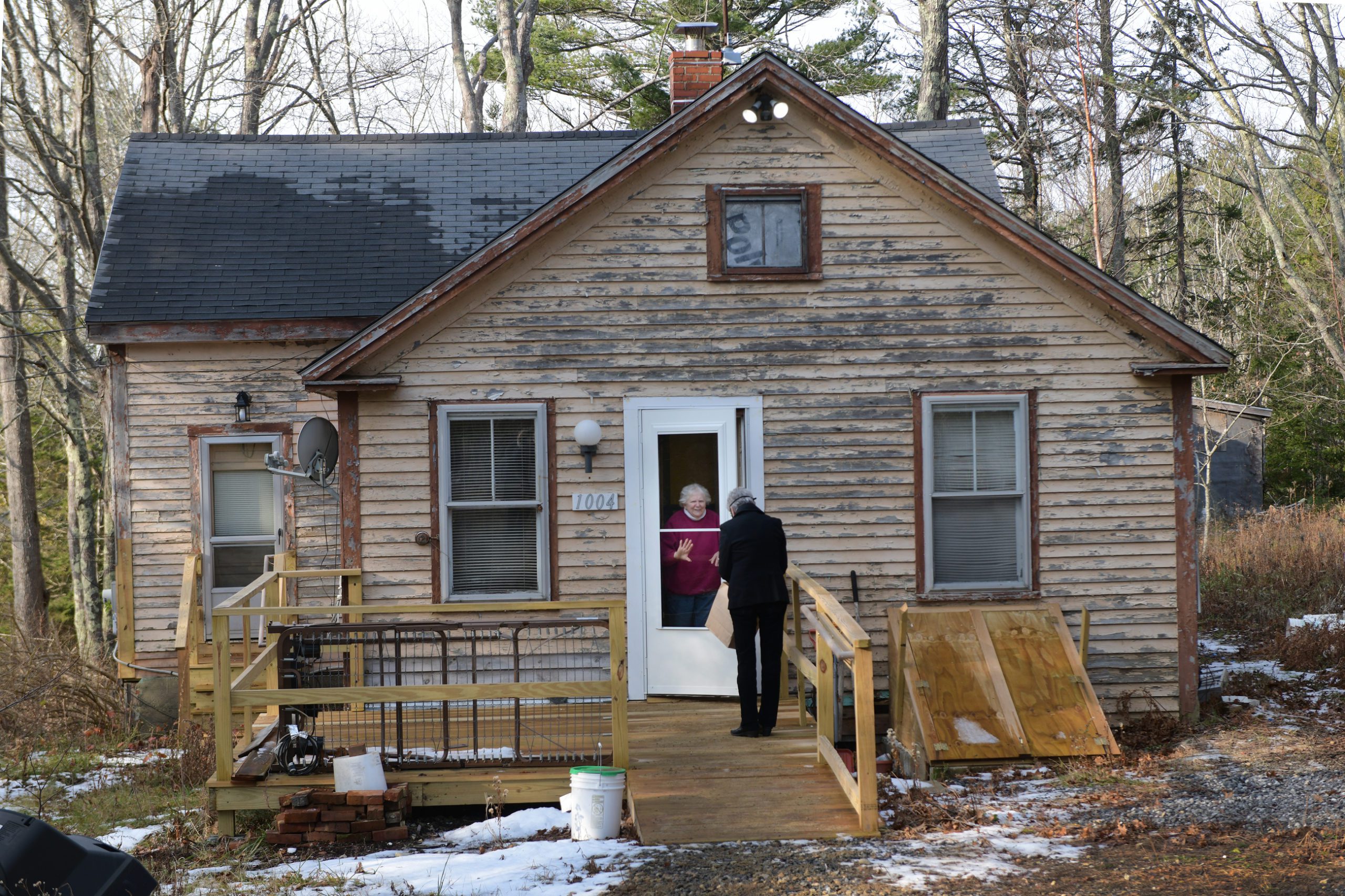
Mauer fretted about seniors in their 70s and 80s getting COVID-19 from community exposure.
“They were running into the fire,” Mauer said. “I was worried they were going to get sick.”
But Hardcastle and her volunteers persisted, and promised to follow CDC regulations and remain safe. Word of the meals-to-go program spread around the town of 5,000. Over 150 cooks volunteered, and several other people agreed to drive and help package the food.
The meals cooked in kitchens throughout the seaside town were extraordinary, Hardcastle said.
“We had beef bourguignon, lobster mac and cheese, chicken cacciatore,” she said. “And the desserts were wonderful, too.”
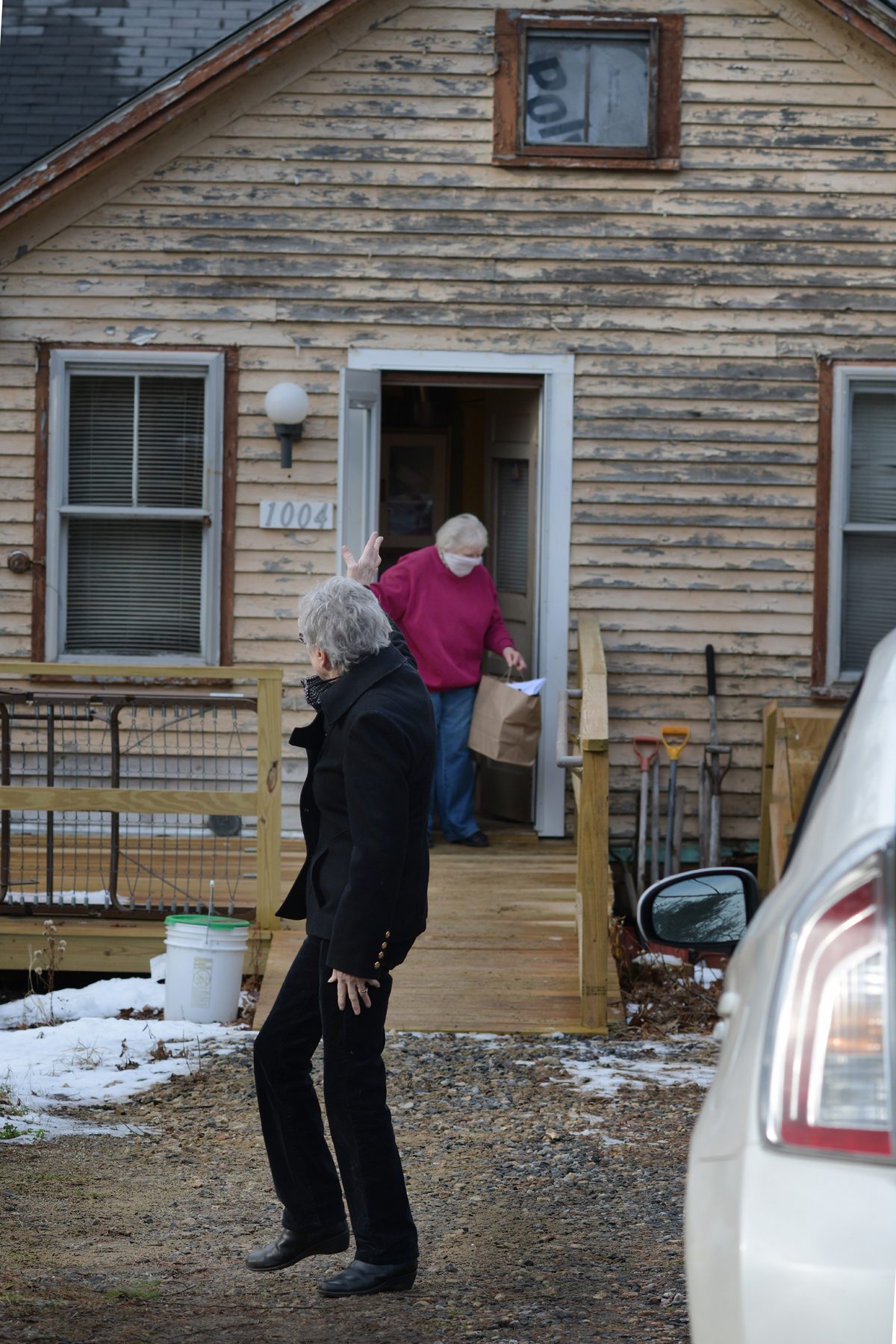
From mid-March through the end of June, Hardcastle and her volunteers prepared and delivered 5,555 meals to 2,208 people.
“It was remarkable in a town of 5,000,” said Mauer, whose agency honored Hardcastle with a Trailblazer Award this year. “Surrey is a force, and she pulled the town together to do this.”
Preparing two to five meals for up to 170 people a week cost volunteers thousands of dollars. To offset the cost, Hardcastle relied on contributions from Midcoast Hunger Prevention Program and the Merrymeeting Gleaners.
“The program was a labor of love,” Hardcastle said. “But it could be expensive.”
Harpswell’s elderly looked forward to the meals each Tuesday. One appreciative woman wrote Hardcastle, explaining, “You know, in most places Christmas comes once a year, but here in Harpswell we have Christmas every Tuesday. It’s just a delight to go outside and see what I’ve got to eat.”
Brenda Bonney is one of the many seniors grateful for the meals that are now delivered twice a month. She is 78 and lives alone. With diabetes, she is considered high-risk for COVID.
“I really have to be careful and don’t go to the grocery store too much,” she said.
RELATED: Running on empty
She considers Hardcastle and her volunteers as family.
“All the people that you meet through the food program, they’re just like people you have known all your life, like family,” she said. “It makes me feel good to know someone is watching over me.”
As the pandemic surges, Hardcastle and her volunteers will continue to nurture and cook for their elderly friends. A retiree who moved to the community in 2007 with her husband, Hardcastle considers herself blessed to have settled among such kind and caring people.
“I love the generosity and spirit of this town,” she said. “Everyone has everyone else’s back. We’re all in this together.”
• • • •
The familiar face on the television news caught Rev. Carolyn Lambert’s attention.
One of her parishioners cried while talking about her husband, who lives in a South Portland nursing home. Like many family members, Mary Altenbern has not been able to visit her spouse for several months due to the pandemic.
“It’s a very lonely life without him,” a tearful Altenbern told NewsCenter Maine. “To put my arms around him would be everything.”
The minister listened as Altenbern’s voice cracked with emotion.
“That’s when I lost it,” said Lambert. “I just lost it.”
The weight of comforting the grief-stricken had grown heavy.
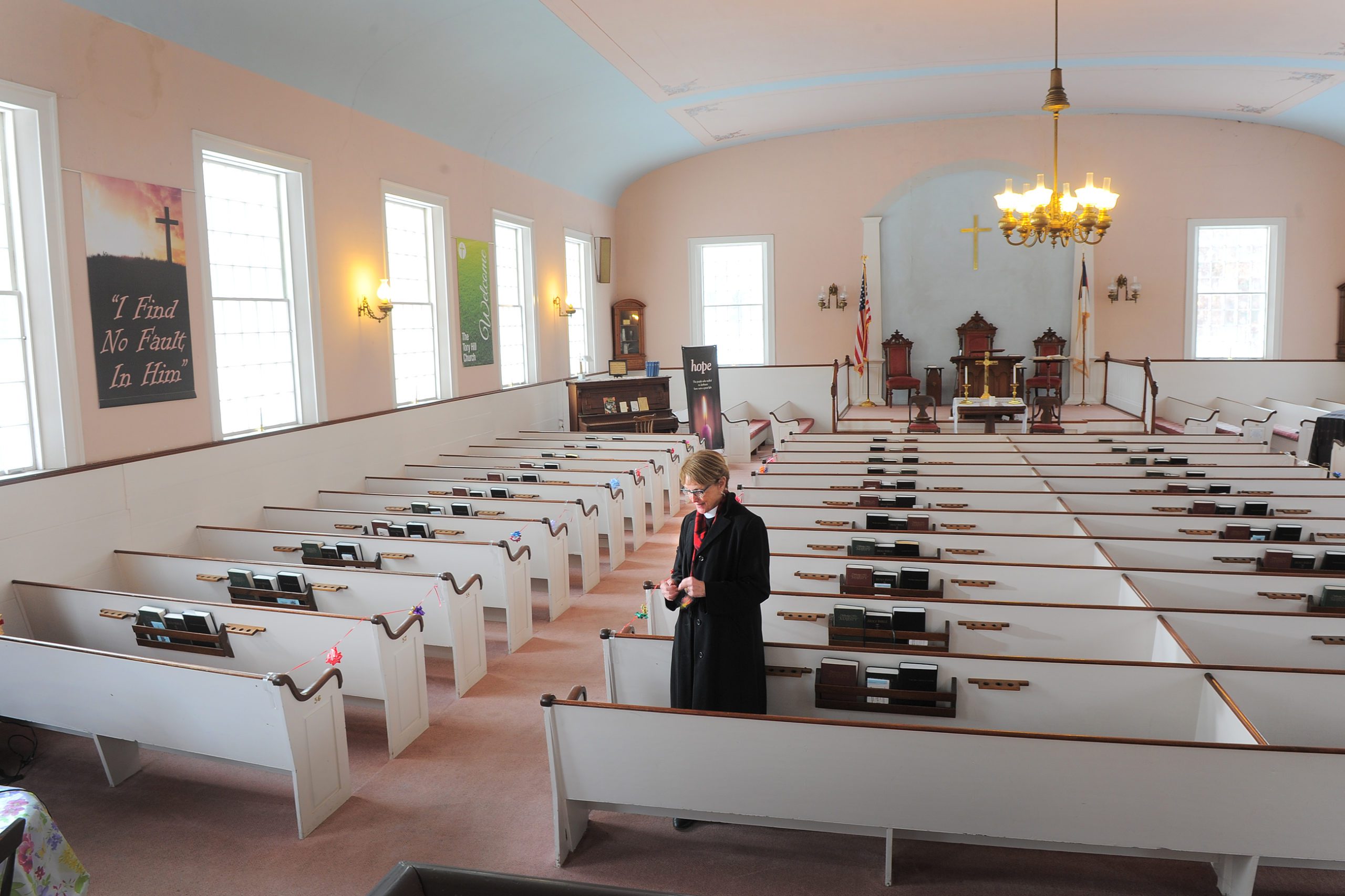
Over the past 10 months, the minister has consoled hundreds of people. Families barred from hospitals and nursing homes as their loved ones lay dying. Heartbroken wives, husbands, and children unable to hug or visit relatives confined in long-term care facilities. Families forced to put their grief on hold as they postpone wakes, services and final farewells.
“Nobody ever teaches in the seminary how we are going to deal with our own grief,” Lambert said. “Listening to someone’s stories about their loved ones is so important. It lightens their burden a bit but we always take a piece of their grief with us.”
And grief, Lambert said, has grown larger during the pandemic, burdening families, ministers and funeral directors.
“It’s grief that is exponential,” Lambert said.
A minister for 23 years, serving churches in Portland, South Berwick, Kennebunkport and now at the First Congregational Church in Buxton, Lambert has plenty of experience comforting parishioners. But COVID-19 has added to the layers of anguish.
RELATED: The Last Responders: Consoling the dying and grieving in the COVID-19 era
“When they can’t see someone that is confined to a nursing home, it’s like someone dies a little death each day,” Lambert said. “Their grief has become a load that has become heavier.”
Since March, the minister has counseled 30 families who have not been able to say final goodbyes to loved ones who died in hospitals or nursing homes. Five of those families lost someone to COVID-19.
“They’re just so broken that they didn’t get to hold that person or really talk to them,” Lambert said. “Sometimes it’s a grandchild in their late teens, and it’s the first person they ever lost. Their grief is so big and so raw.”
When Lambert meets with families, she encourages them to share memories about their parents, grandparents or spouses.
“I listen to their stories about where their loved ones grew up, who they loved, what made them laugh, what made them cry,” Lambert said. “The memories are important and help form a connection back to the person they were missing.”
Though the minister sets her feelings aside to care for others, sometimes emotions can overwhelm, especially when there’s a personal connection to death.
Nobody ever teaches in the seminary how we are going to deal with our own grief. Listening to someone’s stories about their loved ones is so important. It lightens their burden a bit but we always take a piece of their grief with us.”
— Carolyn Lambert, minister at the First Congregational Church in Buxton
In early December, she officiated a funeral service for one of her colleagues who died suddenly. He was a Portland part-time funeral attendant who recently retired from his full-time job as a police officer.
“His death blew the socks off of everyone at the funeral home and me,” Lambert said. “It was someone that we cared deeply about.”
Lambert and the funeral workers at Jones, Rich and Barnes Funeral Home in Portland comforted each other as they grieved.
“They’re my family,” said Lambert.
Like members of the clergy, funeral directors are struggling to cope.
With COVID-19 infections surging, there is a lot more stress and precautions involved with end-of-life rituals. Funeral workers must wear layers of protective gear while transporting bodies, especially those with the virus. They also spend hours disinfecting the funeral home.
“It’s kind of made the year a blur,” said Doug Bibber of Bibber’s Funeral Home in Kennebunk. “While the funeral home profession is 24/7, usually you’re able to find a little down time. That’s gone by the wayside. You’re concerned with, ‘Have I done everything I need to do? Have I not cleaned a particular service that could possibly lead to a bad event happening?’ ”
The most difficult aspect of the pandemic restrictions, said Bibber, is the absence of the human touch at wakes, funeral services and consultations. Like many small-town funeral homes, Bibber knows most of the families that use the business his grandfather started in 1938.
During the state’s first shutdown in March, one of the first calls to the funeral home came from a family Bibber had known for much of his life. They lost a son who had been in a long-term care facility for many years.
“When I went into the facility to bring him into our funeral home, we couldn’t hug each other,” Bibber said. “It was so unnatural. It leaves you feeling hollow. It left my friends feeling hollow.”
Bibber has also had to transport a friend’s family member who died of COVID-19.
“Usually when you go into the home, comforting the family is the first step we take in the grief process, but now there is a layer of protective gear and plastic between us,” Bibber said.
As they struggle to do their jobs, the bond between last responders – ministers and funeral workers – has grown tighter.
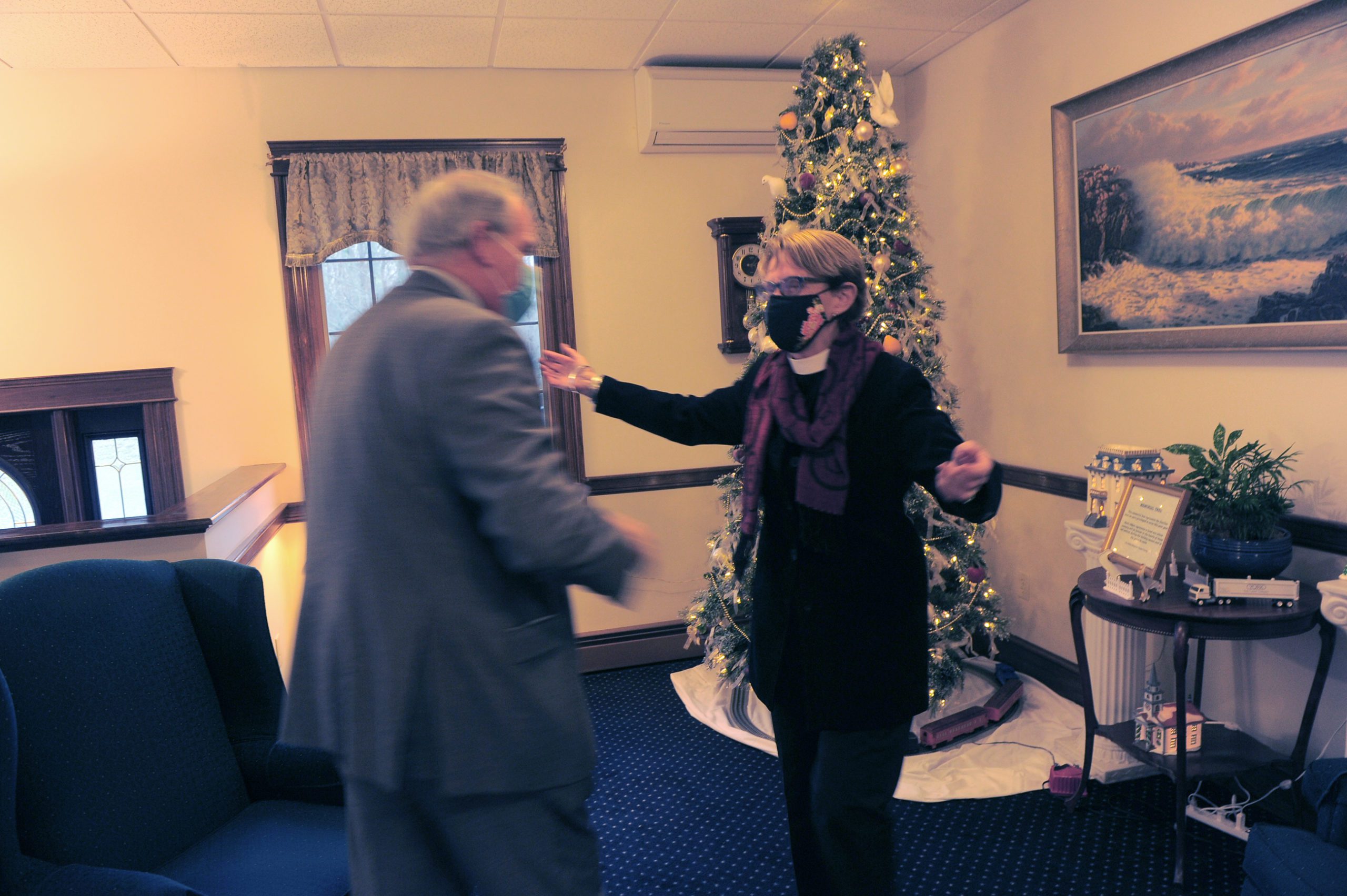
“We’ve really reached out to support each other,” said Erik Tiner, a funeral director at Jones, Rich and Barnes. “I’ve had a lot of conversations with my fellow funeral directors about what they’re going through. There certainly have been more conversations to get stuff off your chest.”
Like Lambert, who can no longer comfort people dying in hospitals or long-term care facilities, funeral home directors have had to curtail many end-of-life rituals. As indoor limits were set to 10 people in the spring and 50 in the fall, funeral workers tied balloons to chairs or placed flowers and pictures of missing relatives on empty seats during wakes. They have streamed and recorded services for those unable to attend. And they continue to postpone scores of funerals until late spring or summer.
Despite the added stress and complications, Tiner holds onto the reason he got into the funeral business 16 years ago.
“When my grandmother passed away, I was 18 and the funeral director that took care of her did such an amazing job, I knew that’s what I wanted to do.”
Despite the pandemic, the precautions and restrictions, Tiner remains passionate about helping families celebrate the life of someone they loved.
“We can’t snap our fingers and have COVID be gone,” Tiner said. “All we can do is make it the best possible experience for the families that are going through one of the most difficult experiences of their lives.”
As the days grow shorter and the virus surges, Rev. Lambert continues to pray for her last responder family, her parishioners and for hope.
“During these dark days, we’ve all got to stay connected, to be there for each other in any way possible,” Lambert said.




